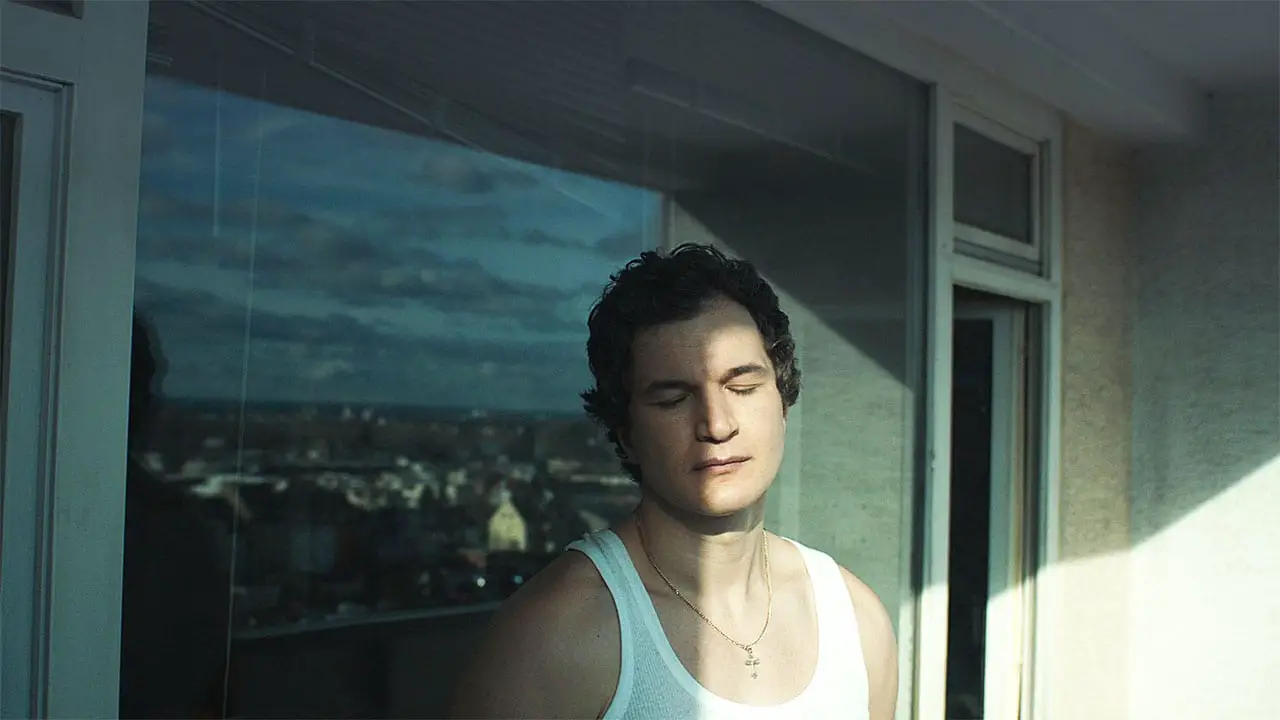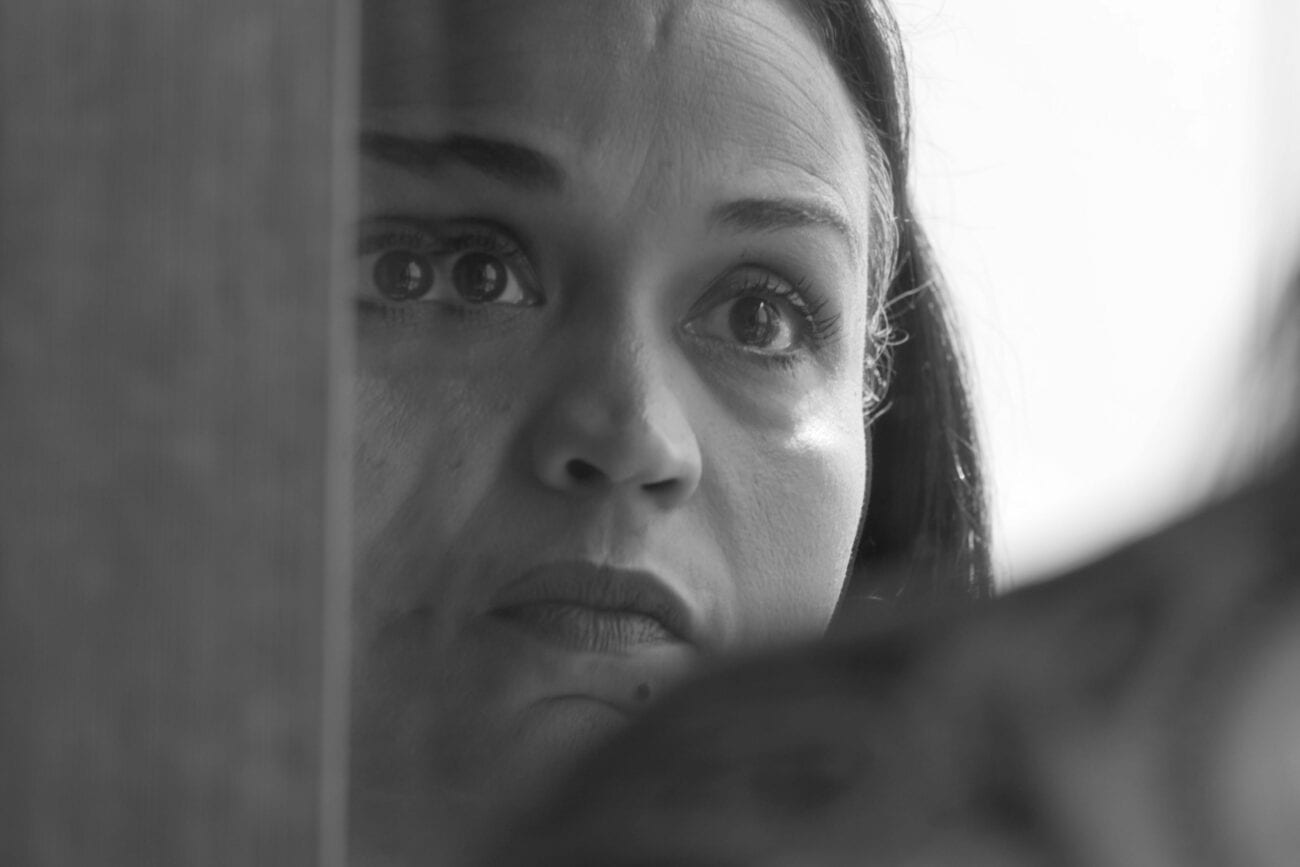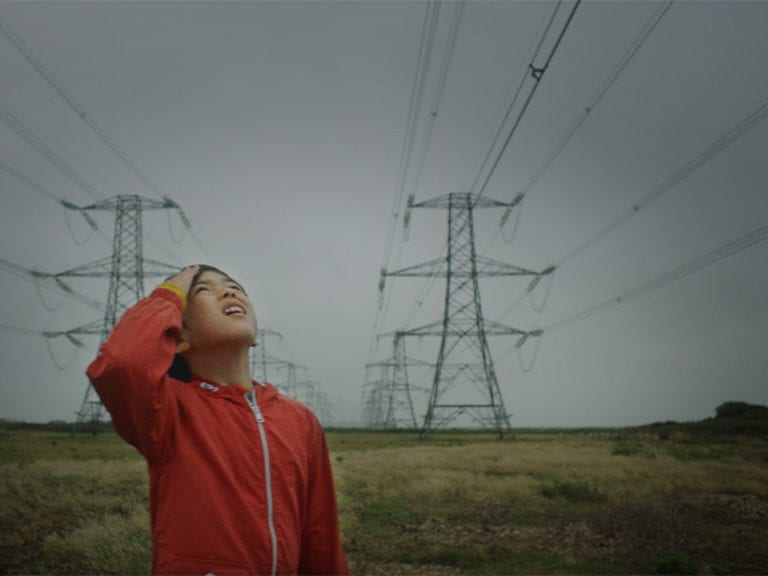The third day of the London Film Festival brought in person screenings of Herself, Time and Shirley, and virtual public screenings of Relic, 180 Degree Rule, Farewell Amor, Shirley and The Reason I Jump. The schedule for the 9th October was particularly tight, so there’s plenty of quality cinema to discuss, including another restored classic, the aforementioned pair of Sundance award winning documentaries, a soul-shaking Colin Firth-Stanley Tucci starring drama, and the newest film from London Film Festival regular Małgorzata Szumowska.
Never Gonna Snow Again
The day’s programme kicked off with a strange appetiser in the form of Małgorzata Szumowska and Michal Englert’s satire Never Gonna Snow Again. Despite being the longest of the day’s releases, it also felt like the least substantial of the set. From its haunting opening out of a gothic horror—with protagonist Zhenia emerging from the woods, walking purposefully into town in a series of extreme long shots—the film never makes that strong of a connection with any of the many themes it chooses to touch on.
Born in Pripyat, seven years to the day before the disaster at Chernobyl, Zhenia is an itinerant masseur with seemingly superhuman powers of hypnotism and charisma. The dryly sensuous, but often cloyingly inert, social satire follows this migrant faith healer as he tends to the needs of the bourgeois residents of an affluent gated community.
The film is set in the run up to Christmas, and makes many subtle allusions to miraculous happenings and something angelic in the enigmatic central character, who apparently speaks “all languages”. However, he is quite definitely human, and its in his more private moments, away from the needs of his eccentric flock, that the film seems to almost come alive, introducing brief, dreamlike flashbacks to his childhood in Chernobyl. These brief sections broach intriguing ideas of social memory and loss that are among the film’s stronger themes, and introduce elements of mystery and suspense as well as the film’s default tone of wry sexual intrigue. More than one of Zhenia’s housewife clients develops a crush on him as the film rips affectionately and rather toothlessly into their lives of idleness and complacency, indulging in an often indulgently sensuous relationship with its characters’ bodies.

The camera plays with an often striking use of light, incorporating some eerily beautiful dream sequences, however the bulk of the film is spent merely following Zhenia as he gets to know the various residents of the suburb in their often interchangeable homes. This rather loose structure is sadly unsupported by a strong set of themes, characters, emotional connections, or even much good humour, which are each as thin on the ground as the plot. All of these interests are fed at points; however, the film is lacking a singular sense of focus or direction, and despite, or perhaps because of the simplicity and looseness of its narrative, Never Gonna Snow Again is slow and rather tiring.
At points the film does coalesce into something engaging, at times coming across as a tender love letter to the migrant workers upon whom developed nations are reliant, and there’s a perplexing environmental coda that was hardly set up. However much the film may succeed on a momentary level, it ends up being only a vaguely pleasant diversion, rather than a really satisfying exploration of its best ideas.
Time
“Love: if it was an acronym, it would be Life’s Only Valid Expression.”
Winner of the U.S. Documentary Directing Award, Garrett Bradley’s Time takes an ethereal and poetic approach to a subject matter that is typically handled polemically, resulting in a uniquely moving and memorable experience. Utilising a combination of documentary and home video footage and presented in crisp monochrome, Time tells the story of Fox Rich, who became an unlikely activist and abolitionist when her husband, and the father to her six sons, was sentenced to sixty years in jail for armed robbery.

Rich herself served three and a half years in jail for her own role in the crime, and the film follows her and her family’s lifelong struggle to see her husband released, now approaching twenty long years of hard work, separation, financial pressure, and one crushing disappointment after another.
The elegiac and folkloric tone conjured by the black and white footage and gracefully incorporated soundtrack juxtaposes beautifully with the urgency and timeliness of its themes and iconography, deftly articulating both the scope and the historical weight of her struggle. Through the music and deep south iconography, her story invokes not only the weight of local history, but American myth. Like the recent Queen & Slim, Time understands the power of icons and legend, and the film—the significance of whose title becomes more layered and potent as it goes on—is dense with the effects of history, both social and personal, and is eager to elevate Fox as an inspiring modern icon, emblematic of the strength and resilience of black womanhood.
Time concerns itself little with the procedural minutiae of Fox’s efforts, which are principally focused on educating and forging a sense of community with other women in similar situations, and with appealing for judges to commute the wildly excessive sentence. One would need to seek out a different source to see more of an objective overview of the systemic issues she, her family, and her community are faced with (for which I would recommend Ava DuVernay’s documentary 13th, which explicitly discusses the history and development of America’s racially stratified, over-budgeted, run-for-profit prison system). Instead, Time resonates on a more intimate and personal level, exploring the pinpoint details and specificity of her story, presenting Fox and her family’s struggle as almost a contemporary counterpart to The Color Purple: a graceful and epic tale of time, the power of love, the resilience of family, and the tragic injustice of separation.
Supernova
The unshakable and enduring power of love is also key to the next film, Harry McQueen’s devastatingly naturalistic romantic drama Supernova. Following in the footsteps of a film like Ordinary Love or even the much less accessible Amour, Supernova paints a devastating portrait of the inevitable final separation that awaits all couples and is, in its own phenomenally reserved, middle-brow and mature way, one of the truest and most beautiful films ever made about love and death.
Following Tusker’s (Stanley Tucci) diagnosis with early-onset dementia, he and his partner of many years Sam (Colin Firth) embark on a road trip, with the ostensible purpose of visiting friends and reliving the memories Tusker will soon lose. These early scenes establish the familiar and comfortable world the two have built together, appropriately enough, in a mobile home, and we slowly witness the inexorable force working it loose at the foundations. Sam soon discovers that Tusker in fact had ulterior motives for arranging the trip, a revelation that leads us to the film’s captivating third act.
As the two confront Tusker’s illness and mortality together, the nature and depth of their love are revealed to one another and it is at this point that the film reaches its emotional zenith. The casual and mundane interactions of their earlier daily lives break down into a barely contained boiling pot of feeling as both men prematurely mourn for what they are about to lose. However high the emotions run though, McQueen and his leads keep a tender and respectful composure, ensuring that nothing ever for a second tips over into hysteria or melodrama.
Tusker, as well as being a novelist, is an amateur astronomer, and the film takes its title from the expansion that occurs as a star begins to glow its last. It’s a delicate, and slightly inaccurate expression of what is taking place between the two men, and cinematographer—and frequent Mike Leigh collaborator—Dick Pope captures that delicacy beautifully. Harry McQueen may do a stunning job directing his sophomore feature and his script is wonderfully nuanced and believably drawn, but highest praise has to go to the two veterans in the lead roles. In both the earlier moments and the latter movements, Tucci and Firth capture a dynamic that feels one-hundred percent real and natural, and as controversial as it may sound, this might well be both actors’ finest hour.
The Reason I Jump
The Reason I Jump, published in the mid-2000s, is a short memoir written by a Naoki Higashida, a thirteen-year-old Japanese boy living with non-verbal autism, an extreme form of autism affecting his speech. This The Reason I Jump is a film that, while taking the book of the same name as a starting point, seeks to explore the lives and experiences of autistic adolescents around the world, from the UK and USA to India and Sierra Leone.
As characterised by the film, and in a manner the film aims to emulate, the book shattered many misconceptions about non-verbal autism, many of which have led to inexpressibly harmful results, with some social narratives, including religious superstitions, even leading to euthanasia throughout history and many parts of the world. Although a person with non-verbal autism may be unable to replicate speech, this does not mean that they cannot understand what is being said to them. Non-verbal autism can almost create a kind of locked-in-syndrome, where those diagnosed with it struggle immensely with expressing themselves. One girl in India overcame this difficulty somewhat through drawing, and has become a successful artist, producing many striking paintings, while speech therapists in the US have discovered other methods of non-verbal communication.

Of course, this difficulty with speech is not the only symptom, and the film makes excellent use of its camera and sound design to convey the sensorial experience of an autistic mind to the neurotypical, using amplified sound and extreme shallow focus closeup establishing shots to replicate the descriptions of sense in the book. As sensations are often extremely acute for people with autism, particularly pleasurable or harsh sounds can have a huge impact on their lives. One young man in the UK finds himself drawn to the soothing hum of green power substation boxes.
The Reason I Jump not only examines the experiences of those with non-verbal autism, but of their families as well, as they attempt to understand what they are feeling and read their needs. Among the parents interviewed is author David Mitchell whose translations of the book with Keiko Yoshida brought it to English speaking attention, and through its broad and varied canvas and sensitive uses of stylism, The Reason I Jump does an admirable job of translating Higasida’s vital message to yet another new audience.
The Cheaters
The final screening of the day brought us another restoration from cinema’s vaults, this time courtesy of the National Sound and Film Archive of Australia: Paulette McDonagh’s 1929 silent melodrama The Cheaters, brought with a solo piano accompaniment (the pianists hands featured in a not at all distracting box in the corner of the screen). After kicking off with a dramatic opening in which an employee swears revenge on the callous industrialist who ruins his life, we then transition forward twenty years and are presented with a scenario not unlike that of classic romantic comedy The Lady Eve or this festival’s very own Kajillionaire. That employee, now an old man, has spent the last twenty years raising his daughter to be a born grifter, with the intention of pulling off possibly the longest con in cinema history, only for her to end up following her heart instead.
The story is spry, fairly typical stuff for the era, preoccupied with love, fate and status and it must be said the gold is front loaded with a series of nicely ahead of their time, proto-The Sting reveals. Female filmmakers were actually more common than one might have thought in pre-code days, and in Australia McDonagh evidently made quite a career: the film was accompanied by a short trailer for another of her earlier films Those Who Love from 1925. It’s a shame that The Cheaters doesn’t display a more modern sensibility than many of its contemporaries, but for aficionados of the silent era it makes for an engaging piece of coincidence-driven melodrama.



